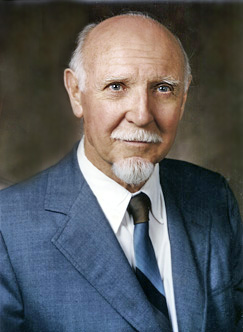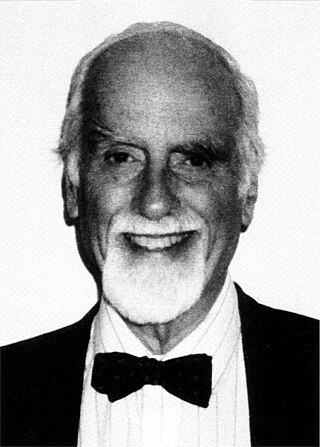Related Research Articles
Industrial and organizational psychology "focuses the lens of psychological science on a key aspect of human life, namely, their work lives. In general, the goals of I-O psychology are to better understand and optimize the effectiveness, health, and well-being of both individuals and organizations." It is an applied discipline within psychology and is an international profession. I-O psychology is also known as occupational psychology in the United Kingdom, organisational psychology in Australia and New Zealand, and work and organizational (WO) psychology throughout Europe and Brazil. Industrial, work, and organizational (IWO) psychology is the broader, more global term for the science and profession.
Psychology is the scientific study of mind and behavior. Its subject matter includes the behavior of humans and nonhumans, both conscious and unconscious phenomena, and mental processes such as thoughts, feelings, and motives. Psychology is an academic discipline of immense scope, crossing the boundaries between the natural and social sciences. Biological psychologists seek an understanding of the emergent properties of brains, linking the discipline to neuroscience. As social scientists, psychologists aim to understand the behavior of individuals and groups.
Psychometrics is a field of study within psychology concerned with the theory and technique of measurement. Psychometrics generally covers specialized fields within psychology and education devoted to testing, measurement, assessment, and related activities. Psychometrics is concerned with the objective measurement of latent constructs that cannot be directly observed. Examples of latent constructs include intelligence, introversion, mental disorders, and educational achievement. The levels of individuals on nonobservable latent variables are inferred through mathematical modeling based on what is observed from individuals' responses to items on tests and scales.
Psychological testing refers to the administration of psychological tests. Psychological tests are administered or scored by trained evaluators. A person's responses are evaluated according to carefully prescribed guidelines. Scores are thought to reflect individual or group differences in the construct the test purports to measure. The science behind psychological testing is psychometrics.

The Rorschach test is a projective psychological test in which subjects' perceptions of inkblots are recorded and then analyzed using psychological interpretation, complex algorithms, or both. Some psychologists use this test to examine a person's personality characteristics and emotional functioning. It has been employed to detect underlying thought disorder, especially in cases where patients are reluctant to describe their thinking processes openly. The test is named after its creator, Swiss psychologist Hermann Rorschach. The Rorschach can be thought of as a psychometric examination of pareidolia, the active pattern of perceiving objects, shapes, or scenery as meaningful things to the observer's experience, the most common being faces or other pattern of forms that are not present at the time of the observation. In the 1960s, the Rorschach was the most widely used projective test.
Forensic psychology is the application of scientific knowledge and methods to help answer legal questions arising in criminal, civil, contractual, or other judicial proceedings. Forensic psychology includes research on various psychology-law topics, such as jury selection, reducing systemic racism in criminal law; eyewitness testimony, evaluating competency to stand trial; or assessing military veterans for service-connected disability compensation. The American Psychological Association's Specialty Guidelines for Forensic Psychologists reference several psychology subdisciplines, such as social, clinical, experimental, counseling, and neuropsychology.
Clinical psychology is an integration of human science, behavioral science, theory, and clinical knowledge for the purpose of understanding, preventing, and relieving psychologically-based distress or dysfunction and to promote subjective well-being and personal development. Central to its practice are psychological assessment, clinical formulation, and psychotherapy, although clinical psychologists also engage in research, teaching, consultation, forensic testimony, and program development and administration. In many countries, clinical psychology is a regulated mental health profession.

A personality test is a method of assessing human personality constructs. Most personality assessment instruments are in fact introspective self-report questionnaire measures or reports from life records (L-data) such as rating scales. Attempts to construct actual performance tests of personality have been very limited even though Raymond Cattell with his colleague Frank Warburton compiled a list of over 2000 separate objective tests that could be used in constructing objective personality tests. One exception, however, was the Objective-Analytic Test Battery, a performance test designed to quantitatively measure 10 factor-analytically discerned personality trait dimensions. A major problem with both L-data and Q-data methods is that because of item transparency, rating scales, and self-report questionnaires are highly susceptible to motivational and response distortion ranging from lack of adequate self-insight to downright dissimulation depending on the reason/motivation for the assessment being undertaken.
The Barnum effect, also called the Forer effect or, less commonly, the Barnum–Forer effect, is a common psychological phenomenon whereby individuals give high accuracy ratings to descriptions of their personality that supposedly are tailored specifically to them, yet which are in fact vague and general enough to apply to a wide range of people. This effect can provide a partial explanation for the widespread acceptance of some paranormal beliefs and practices, such as astrology, fortune telling, aura reading, and some types of personality tests.

Raymond Bernard Cattell was a British-American psychologist, known for his psychometric research into intrapersonal psychological structure. His work also explored the basic dimensions of personality and temperament, the range of cognitive abilities, the dynamic dimensions of motivation and emotion, the clinical dimensions of abnormal personality, patterns of group syntality and social behavior, applications of personality research to psychotherapy and learning theory, predictors of creativity and achievement, and many multivariate research methods including the refinement of factor analytic methods for exploring and measuring these domains. Cattell authored, co-authored, or edited almost 60 scholarly books, more than 500 research articles, and over 30 standardized psychometric tests, questionnaires, and rating scales. According to a widely cited ranking, Cattell was the 16th most eminent, 7th most cited in the scientific journal literature, and among the most productive psychologists of the 20th century. He was a controversial figure due in part to his friendships with, and intellectual respect for, white supremacists and neo-Nazis.

Henry Alexander Murray was an American psychologist at Harvard University. From 1959 to 1962, he conducted a series of psychologically damaging and purposefully abusive experiments on minors and undergraduate students. One of those students was Ted Kaczynski, later known as the Unabomber.
Lewis R. Goldberg is an American personality psychologist and a professor emeritus at the University of Oregon. He is closely associated with the lexical hypothesis that any culturally important personality characteristic will be represented in the language of that culture. This hypothesis led to a five factor structure of personality trait adjectives. When applied to personality items this structure is also known as the five-factor model (FFM) of personality. He is the creator of the International Personality Item Pool(IPIP), a website that provides public-domain personality measures.
Walter Mischel was an Austrian-born American psychologist specializing in personality theory and social psychology. He was the Robert Johnston Niven Professor of Humane Letters in the Department of Psychology at Columbia University. A Review of General Psychology survey, published in 2002, ranked Mischel as the 25th most cited psychologist of the 20th century.
Raymond D. Fowler was an American psychologist and Professor Emeritus of the University of Alabama. He was president of the American Psychological Association (1988) and served as APA's executive vice president and chief executive officer (CEO) from 1989 to 2003.
Psychological evaluation is a method to assess an individual's behavior, personality, cognitive abilities, and several other domains. A common reason for a psychological evaluation is to identify psychological factors that may be inhibiting a person's ability to think, behave, or regulate emotion functionally or constructively. It is the mental equivalent of physical examination. Other psychological evaluations seek to better understand the individual's unique characteristics or personality to predict things like workplace performance or customer relationship management.

David Clarence McClelland was an American psychologist, noted for his work on motivation Need Theory. He published a number of works between the 1950s and the 1990s and developed new scoring systems for the Thematic Apperception Test (TAT) and its descendants. McClelland is credited with developing Achievement Motivation Theory, commonly referred to as "need for achievement" or n-achievement theory. A Review of General Psychology survey published in 2002, ranked McClelland as the 15th most cited psychologist of the 20th century.
Krugman is an Americanized form of the German surname Krugmann, an occupational surname based on occupation of a jug/mug seller/manufacturer or of an innkeeper. Notable people with the surname Krugman or Krugmann include:

Gardner Murphy was an American psychologist who specialized in social and personality psychology and parapsychology. His career highlights include serving as president of the American Psychological Association and the British Society for Psychical Research.
Rodney L. Lowman is an American psychologist, academic administrator and entrepreneur whose major contributions have been in the areas of career assessment and counseling, ethical issues in Industrial and Organizational Psychology, the integration of clinical psychology and I-O psychology and helping to develop the field of consulting psychology. In a study of the most prolific contributors to the Consulting Psychology Journal: Practice and Research, Lowman was rated the second highest contributor for articles for the period 1992–2007.
Society for Personality Assessment (SPA) is the largest psychological society focused on personality assessment. It was founded in 1937 by Bruno Klopfer as the Rorschach Institute, renamed as The Society for Projective Tests and the Rorschach Institute in 1948, shortened to The Society for Projective Techniques in 1960, and given its current name in 1971.
References
- 1 2 Bruce Lambert. "Dr. Morris Krugman, A Psychologist, 94, In New York Schools". New York Times , 2/24/1993.
- ↑ Ann M. O'Roark, John E. Exner. "History and Directory: Society for Personality Assessment Fiftieth Anniversary".